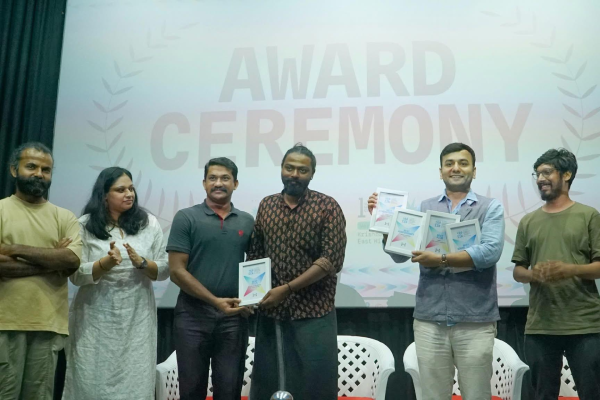
Achievement: Slaves of the Empire has won the "Tongues on Fire Flame" Award for Best Documentary at the UK Asian Film Festival held in London.
The international film festival took place at the Phoenix Theatre in Leicester, London, from May 1 to 11. The award for Best Documentary was given to this film, which portrays the lives of laundry workers who have been engaged in the profession for decades since the colonial era. More than a hundred films from various countries were screened during the ten-day-long festival.
Slaves of the Empire, a one-hour-long documentary, is directed by Dr. Rajesh James, a faculty member at Sacred Heart College, Thevara. The film is produced by Binoy Varakil , a novelist and faculty member in the English Department at St. Joseph's College, Devagiri, Kozhikode.
Already a recipient of several awards at various film festivals, Slaves of the Empire transcends the boundaries of a conventional documentary; it is a moving work of art that breathes life into the untold stories of an entire community. It intricately blends the history and contemporary realities of the dhobi (washermen) community of Fort Kochi, drawing the viewers deep into their lived experiences.
Through the perspectives of four central characters—Rajan, Pratti, Rajashekharan, and Selvaraj—the film captures the soul of human existence: their struggles, moments of joy, enduring dedication, and shifting ideas of freedom and livelihood.
The film uses the evocative language of black-and-white visuals to invoke nostalgia and a sense of historical depth, while also shedding light on the community's present-day challenges. The daily lives of the laundry workers, their tireless labor, the rhythmic sounds of washing and scrubbing, and stories handed down through generations—all find a voice through this cinematic work.
At its heart, Slaves of the Empire is a tribute to resilience. It doesn't merely document history—it breathes life into it. While making viewers feel the burden of colonial oppression, it also celebrates the undying strength of the human spirit. The film doesn't impose a narrative; it allows the people to speak for themselves, offering an honest and deeply emotional glimpse into their world.
In doing so, Slaves of the Empire transcends the scope of traditional documentaries. It becomes a living archive, a piece of visual poetry, and an imaginative memorial to a community that has endured across generations.
More than anything, this film marks a turning point in Malayalam cinema.